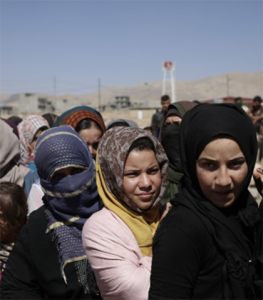COVID sees spike in violence against refugee women
The COVID-19 pandemic has exacerbated violence against refugee women a girls, a new report has found.
The report published by the International Rescue Committee details what violence against women actually looked like after COVID-19 was declared a pandemic, across 15 African countries.
 Interviews with refugee and displaced women within some of the most underfunded and forgotten humanitarian settings found that 73 per cent reported an increase in domestic violence, 51 per cent a rise in sexual violence and 32 per cent observed growth in early and forced marriages.
Interviews with refugee and displaced women within some of the most underfunded and forgotten humanitarian settings found that 73 per cent reported an increase in domestic violence, 51 per cent a rise in sexual violence and 32 per cent observed growth in early and forced marriages.
The report says that currently, refugee women and girls are facing three concurrent crises: their ongoing humanitarian crisis, the health crisis of the COVID-19 pandemic, and the invisible crisis of gender-based violence (GBV).
“The unique circumstances of quarantine, lockdowns, and physical distancing brought on by the pandemic along with existing stressors from dealing with a humanitarian crisis have substantially exacerbated refugee women’s risk of violence and drastically disrupted the lives and futures of refugee women and girls,” the report says.
GBV in refugee populations was a significant issue long before the COVID-19 pandemic, it says.
“Lockdown orders and movement restrictions put in place to reduce the transmission of COVID-19 have made it easier for violence to occur unseen. Social isolation is a major risk factor for violence because it limits access to support services and increases the risk of coercive control by abusive partners,” the report said.
During the Ebola outbreak in West Africa, where quarantine measures similar to those during the COVID-19 pandemic were implemented, women and young girls became vulnerable to sexual coercion, exploitation, and abuse.
“These measures have also disrupted access to health, legal, and social services including shelters, counselling, and sexual and reproductive health services, leaving many refugee women and girls experiencing violence without protection or support,” the report said.
“COVID-19 has also enhanced economic insecurities due to a loss of employment opportunities. Economic insecurity in a relationship is a strong predictor for intimate partner violence. Moreover, financial restrictions or limitations may make it harder for victims to escape an abusive household, thereby perpetuating the ongoing cycle of violence.
“Financial instability is also associated with sex trafficking. By reducing opportunities for economic independence, COVID-19 has intensified risks of violence against refugee women and girls,” the report said.
It also found that the act of migration also exacerbates violence and migrant women and children are particularly at risk.
“Due to COVID-19 outbreak fears, many displaced persons have been forced to relocate several times since the start of the pandemic,” the report said.
“Violence can occur at many points along the journey of a refugee from the point of departure to life in resettlement. COVID-19 has created more stressors and opportunities for violence by fuelling mass migration from pandemic-strained settings.”
The report recommends that interventions to address gender-based violence in refugee communities must strengthen social safety nets for women and public investments in women’s health services.
“Communities can bolster social infrastructure and protections for women. Local and national refugee- and internally displaced people-led, women-led, and women-focused organizations can provide prevention programming to raise awareness of GBV and to promote gender-equitable behaviours and norms among children and adults,” the report says.
“They can also train national authorities, service providers, educators, and child services to identify and mitigate the risks of violence,” it says.
The report recommends governments partner with these local groups to enhance delivery and coordination of services.
“At an institutional level, they can integrate gender analysis in national policy and budgets. Governments must prioritise gender-based violence prevention in emergency preparedness and response plans, considering the rise in gender-based violence during situations of social upheaval,” it says.
“Policies must also allocate funding to local networks and community-led organisations so they can continue to provide accessible, survivor-centred services, support, and care for women experiencing violence during the pandemic.
Strategies to eliminate gender-based violence must also target women’s economic empowerment, political participation and leadership, and movement. To protect women from sexual exploitation and abuse, policies and programing must safeguard women’s role in the economy.
See the full report here: https://www.rescue.org/press-release/new-report-finds-73-refugee-and-displaced-women-reported-increase-domestic-violence












